what is the correct code to perform matrix multiplication on the matrix a and b
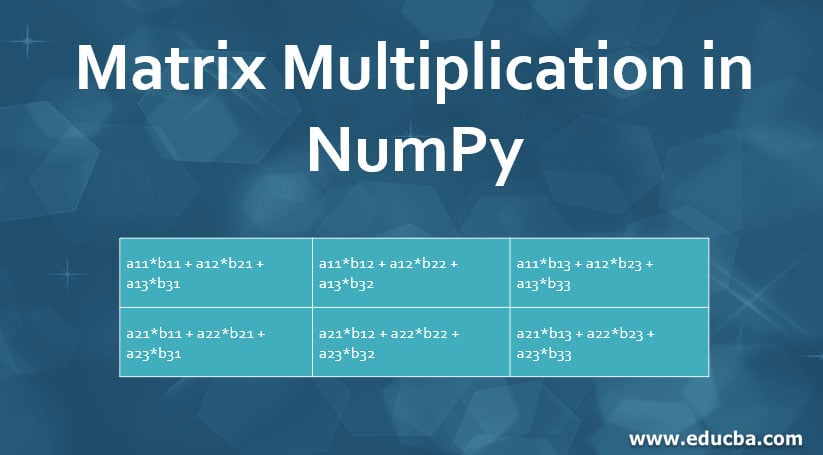
Overview of Matrix Multiplication in NumPy
Matrix Multiplication in NumPy is a python library used for scientific computing. Using this library, nosotros can perform circuitous matrix operations like multiplication, dot product, multiplicative inverse, etc. in a unmarried stride. In this postal service, nosotros volition exist learning about unlike types of matrix multiplication in the numpy library.
Different Types of Matrix Multiplication
In that location are primarily iii different types of matrix multiplication :
| Function | Description |
| np.matmul(array a, array b) | Returns matrix product of ii given arrays |
| np.multiply(array a, array b) | Returns chemical element-wise multiplication of two given arrays |
| np.dot(array a, array b) | Returns scalar or dot production of two given arrays |
1. Matrix product of two given arrays
In club to find the matrix production of two given arrays, we can use the following role :
np.matmul(assortment a, array b)
Input for this function cannot be a scalar value
| A = | all | a12 | a13 |
| a21 | a22 | a23 |
| B = | b11 | b12 | b13 |
| b21 | b22 | b23 | |
| b31 | b32 | b33 |
A @B =
| a11*b11 + a12*b21 + a13*b31 | a11*b12 + a12*b22 + a13*b32 | a11*b13 + a12*b23 + a13*b33 |
| a21*b11 + a22*b21 + a23*b31 | a21*b12 + a22*b22 + a23*b32 | a21*b13 + a22*b23 + a23*b33 |
Example #1
Plan to illustrate the matrix product of two given due north-d arrays.
Code:
import numpy equally np
A = np.array([[1,2,3], [four,v,six]])
B = np.array([[i,1,1], [0,1,0], [one,i,1]])
impress("Matrix A is:\n",A)
print("Matrix A is:\due north",B)
C = np.matmul(A,B)
print("Matrix multiplication of matrix A and B is:\n",C)
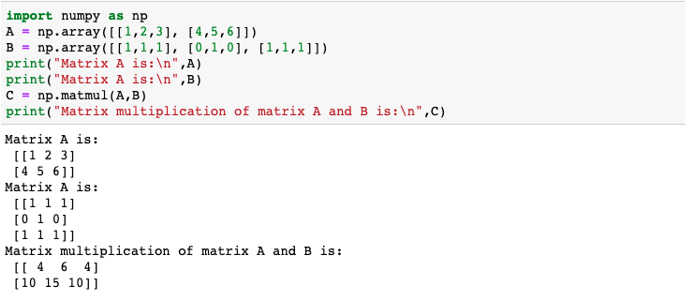
The matrix product of the given arrays is calculated in the following ways:
| B= | i | i | 1 |
| 0 | 1 | 0 | |
| i | i | i |
A @ B =
| 1*1 + two*0 + 3*1 = four | 1*i + 2*1 + 3*i = 6 | one*1 + two*0 + 3*1 = 4 |
| four*ane + v*0 + half-dozen*1 = 10 | 4*1 + v*1 + 6*1 = 15 | iv*one + v*0 + six*ane = 10 |
two. Element wise multiplication of two given arrays
In society to find the element-wise production of two given arrays, we can apply the following function.
np.multiply(array a, assortment b)
| A = | all | a12 | a13 |
| a21 | a22 | a23 |
| B = | a21 | a22 | a23 |
| a21 | a22 | a23 |
A*B =
| a11*b11 | a12*b12 | a13*b13 |
| a21*b21 | a22*b22 | a23*b23 |
Instance #2
Plan to illustrate element-wise multiplication of ii given matrices
Code:
import numpy as np
A = np.array([[1,2,iii], [iv,5,six]])
B = np.assortment([[i,2,3], [four,5,6]])
print("Matrix A is:\n",A)
impress("Matrix A is:\due north",B)
C = np.multiply(A,B)
impress("Matrix multiplication of matrix A and B is:\n",C)
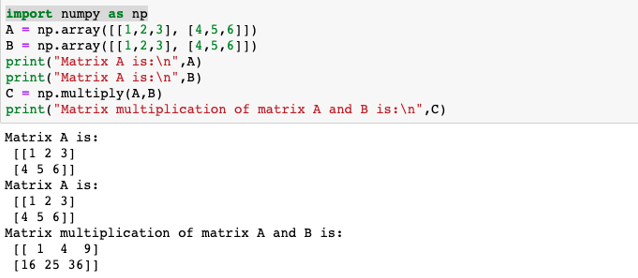
The element-wise matrix multiplication of the given arrays is calculated in the post-obit ways:
| B = | 1 | i | 1 |
| 0 | 1 | 0 | |
| i | i | 1 |
A * B =
| i*1 = 1 | 2*2 = 4 | three*iii = 9 |
| 4*iv = 16 | five*5 = 25 | 6*6 = 36 |
3. Scalar or Dot product of two given arrays
The dot product of whatever two given matrices is basically their matrix product. The just deviation is that in dot production we can take scalar values as well.
A.B = a11*b11 + a12*b12 + a13*b13
Example #3
A program to illustrate dot product of ii given ane-D matrices
Code:
import numpy as np
A = np.array([1,2,iii])
B = np.array([4,5,half-dozen])
print("Matrix A is:\due north",A)
print("Matrix A is:\n",B)
C = np.dot(A,B)
impress("Matrix multiplication of matrix A and B is:\n",C)
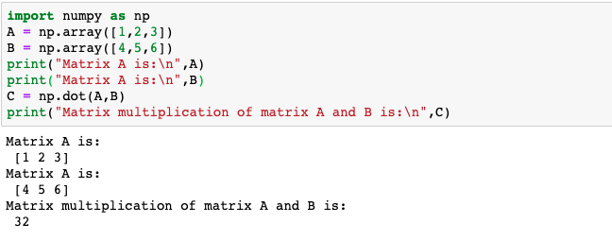
The dot production of two given 1-D arrays is calculated in the post-obit ways:
A.B = 1*4 + two*v + 3*half dozen = 32
Case #4
A program to illustrate dot product of ii given ii-D matrices
Code:
import numpy equally np
A = np.array([[one,2],[2,1]])
B = np.assortment([[4,5],[4,5]])
print("Matrix A is:\northward",A)
impress("Matrix A is:\n",B)
C = np.dot(A,B)
impress("Matrix multiplication of matrix A and B is:\n",C)
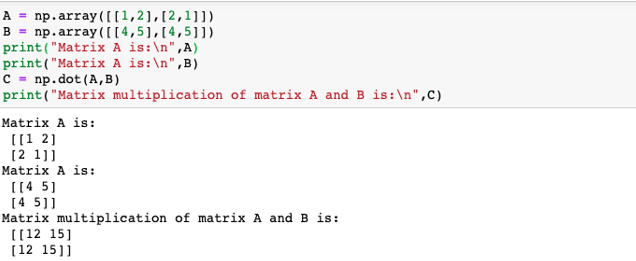
The dot production of given 2D or north-D arrays is calculated in the following ways:
A.B =
| ane*four + 2*4 = 12 | ane*5+2*5 = fifteen |
| 2*4+ 1*4 = 12 | 2*5+ 1*5 = 15 |
Case #5
A program to illustrate the dot product of a scalar value and a 2-D matrix
Lawmaking:
A = np.assortment([[1,one],[1,1]])
impress("Matrix A is:\n",A)
C = np.dot(2,A)
print("Matrix multiplication of matrix A and B is:\n",C)

Scalar value = 2
Then, np.dot(2,A) = 2* A
2*A =
| 1*2 = two | 1*ii = 2 |
| 1*2 = 2 | 1*2 = 2 |
Conclusion
Numpy offers a wide range of functions for performing matrix multiplication. If yous wish to perform element-wise matrix multiplication, so use np.multiply() function. The dimensions of the input matrices should exist the same. And if you have to compute matrix product of two given arrays/matrices and so utilize np.matmul() function. The dimensions of the input arrays should be in the form, mxn, and nxp. Finally, if you have to multiply a scalar value and northward-dimensional array, then utilize np.dot(). np.dot() is a specialisation of np.matmul() and np.multiply() functions.
Recommended Manufactures
This is a guide to Matrix Multiplication in NumPy. Here we discuss the different Types of Matrix Multiplication along with the examples and outputs. You can as well get through our other related articles to learn more–
- Matrix Multiplication in Java
- Multidimensional Array in Java
- NumPy floor()
- Matrix Multiplication in C++
Source: https://www.educba.com/matrix-multiplication-in-numpy/
0 Response to "what is the correct code to perform matrix multiplication on the matrix a and b"
Post a Comment